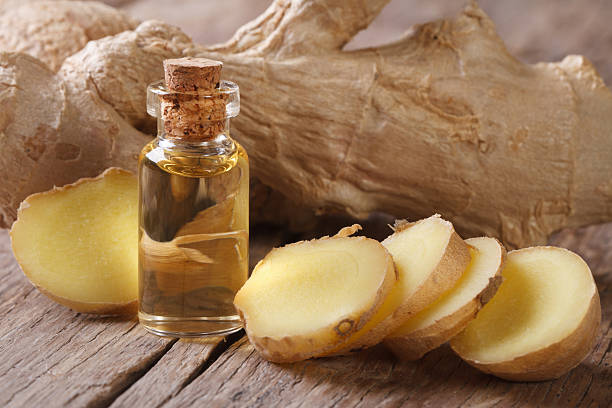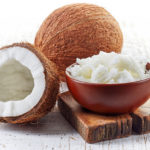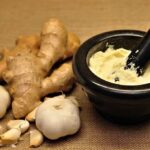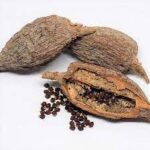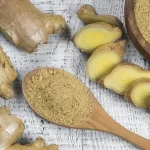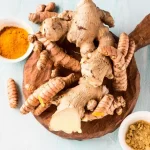Health benefits of Eating Ginger
Helping in digestion is not only the primary benefits of eating ginger. It is one of the plants for the digestive system. As it is, its essential oil helps prevent the formation of gas in the digestive system.
Ginger affects the stomach, joints, intestine, muscles and circulation

The spread of this medicinal plant started when traders carried it from Eastern Asia to the Mediterranean coast.
However, ginger became the most needed or appreciated spice in time past while Dioscorides knew it and had it recommended for those suffering with weak stomach.
As at Middle Age, ginger was exported to Europe where it was mostly appreciated. But, this plant could never be cultivated there.
When the Spaniard Francisco de Mendoza took the seeds to the new whole, it spread rapidly along Mexico, West Indies and Peru.
Learn about the Health Benefits of Goldenseal
Ginger is a vivacious plant of the Zingiberaceae family. It grows up to 1-1.3 m high with exuberant flowers. The flowers resemble orchids. By means of aromatic rhizome it reproduces. The part of the plant to use for medicinal purposes is the rhizome (that is, underground stem).
Properties of Ginger
There are several terpene derivatives contained in the essential oil and this gives the plant its digestive and carminative properties. That is, properties that help prevent gas formation in the digestive system. Therefore, carminative and digestive properties are some of the benefits of eating ginger.
Another fact that may be considered as one of the benefits of eating ginger is that, there is a belief that it may have aphrodisiac effects. This belief is common in India. In essence, ginger is sudorific.
Another one among the benefits of eating ginger is that it is recommended for the treatment of exhaustion, bloated stomach, lack of appetite and flatulence.
Amazing benefits of eating ginger
Internally, cleansing the system through perspiration is one of the benefits of eating ginger. When taken hot, it is quite good for suppressed menstruation and scanty urine.
As stated above regarding its effects on the digestive properties, ginger produces heat into the system and this facilitates digestion. This is because, doses taken frequently will cause a raise on body temperature.
It is also used in dealing with several motion sicknesses such as sea sickness, air sickness. Other benefits of eating ginger include:
- It enormously helpful in diminishing flatulence and their effect is quite milder when taken with laxative herbs.
- Ginger fights inflammation
- It cleanses the colon
- As it stimulates circulation, it reduces spasms and cramps.
- The effects of the usual symptoms are eradicated at the onset of consuming this beautiful medicinal plant.
- Ginger is used to against cough, cramps, headache, colon spasms, contagious diseases, gas, indigestion, nausea, morning sickness sinus congestion and stomach spasms.
In cases of wounds and sores, other benefits of eating ginger include: germ killer, active antioxidant.
Sore Throat

Ginger is number one home remedy for treating sore throat because it stimulates the flow of saliva and brings about soothing. To this effect, the rootstock has to be chewed as it is.
Ginger helps in protecting the liver, stomach and acts well regarding bowel disorders, fever, jot flashes, arthritis, vomiting and muscle pain.
Externally, ginger is used as fomentation especially, on a case as this.
Therefore, remember that certain chemical compounds found in fresh ginger help the body to fight off germs. They are good at preventing growth of bacteria such as E. coli and shigella. Ginger helps in whisking away muscle pain immediately.
Arthritis
Easing arthritis is another one among the benefits of eating ginger. This is due to its anti-inflammatory property which tends to reduce swelling. This is quite helpful in cases such as rheumatoid arthritis and osteoarthritis. Taking a ginger compresses or taking it by mouth or patches on the skin provides relief from pain and other similar symptoms.
Cancer
According to studies, there are bioactive molecules found in ginger which may slow down the growth of cancers such as gastric, skin, liver, ovarian, breast and prostate cancer.
Another study also suggested that this medicinal plant may help your body utilize insulin better. There is need to see if it may improve blood sugar levels.
Battling LDL cholesterol levels is one of the benefits of eating ginger. According study, 5 grams of ginger taken daily for 3 months lowered LDL cholesterol in some people.
Preparation and Uses
Internal use
- Ginger is used as seasoning for raw and cooked foods
- Get 2 grams of the rhizome and make infusion with half a liter of water. After each meal, drink a cup. Do not exceed the recommended dose.
Infusion: steep 5-15 minutes and take 2 oz. at once.
Decoction: Cook 5 – 15 minutes. Take 2 oz. 3 times every day
Tincture: Take 15-60 drops three times on a daily
Extract (Fluid): Take 5 – 20 drops 3 times every day
Syrup: Take 1/2-1 tsp. 3 times a day.
Powder: Take 2-4 #0 capsules (about 10-20 grains) 3 times daily. For nausea and vomiting, it is recommended you take it every 2 hours.
Foods to Avoid for Heart Attack
Rheumatoid Arthritis Foods to Eat
Foods to avoid during Migraine

A graduate of Computer Science and Information Management Technology. Diploma – Caregiving, Certificates – Dementia and Diabetes Awareness and Management. A researcher, blogger, songwriter, singer and acoustic guitarist. Born in an environment where natural talents such as healing are imparted at our natural birth. This natural talents of healing is the result of our genetic inheritance and the training from family environment.











